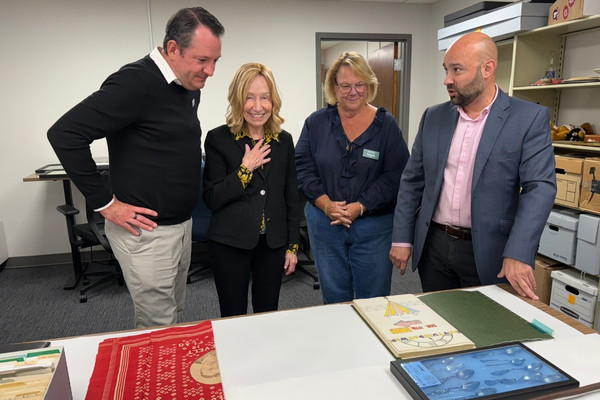Pulitzer Prize–winning historian Doris Kearns Goodwin, one of America’s most celebrated presidential biographers, visited the Dickinson State University Theodore Roosevelt Center on Friday, October 3, as part of her continuing research for forthcoming projects.
Goodwin has spent five decades bringing presidents to life for readers around the world. Her book No Ordinary Time: Franklin and Eleanor Roosevelt: The Home Front in World War II earned her the Pulitzer Prize for History. Dr. Michael Patrick Cullinane, Lowman Walton Chair of Theodore Roosevelt Studies and Co-Director of the Theodore Roosevelt Center, remarked on the significance of her visit: “Doris Kearns Goodwin is one of America’s greatest treasures, and we are so excited that she is turning her hand to another book about T.R.”
Beyond her award-winning books, Goodwin is a public historian. She has served as a consultant and on-screen commentator for numerous documentaries including Ken Burns’ The Roosevelts: An Intimate History. Her ability to connect the lessons of history to contemporary issues has also made her a familiar presence on national television and in public affairs commentary.
A Researcher Among the Archives
Goodwin, who has spent much of her career in the nation’s great presidential archives, was delighted to find a resource like the TR Center in western North Dakota where Roosevelt’s story is still interwoven with local memory. She praised the Center’s extensive digital collections, which she uses regularly in her work.
Goodwin marveled at the efficiency of advanced searches that in other archives would require days, weeks, or months of manual review. When shown how the Center preserves not only Roosevelt’s letters but also correspondence about figures like J.P. Morgan, she exclaimed, “This is amazing! These are going to be great!” She was particularly excited by the quick retrieval of 73 political cartoons featuring the “robber baron” J.P. Morgan.
A Message to DSU’s Next Generation of Leaders
Goodwin was especially touched to learn that her book Leadership: In Turbulent Times is part of the curriculum for DSU’s Theodore Roosevelt Honors Leadership Program. When asked what qualities today’s college students should cultivate to become effective leaders, she pointed to a timeless set of traits:
- Character and Integrity – the moral foundation that earns trust.
- Humility – the willingness to listen, admit mistakes, and learn from others.
- Empathy – the ability to understand and connect with people’s experiences.
- Resilience – strength to recover from setbacks and persist through crises.
- Accountability – taking responsibility for decisions and actions.
- Ambition with Purpose – striving not just for power but for meaningful goals.
- Vision – the capacity to see a path forward and inspire others to follow it.
- Communication – telling stories, shaping narratives, and making ideas accessible.
- Emotional Intelligence – managing one’s own emotions while understanding others.
- Commitment to Something Greater than Self – serving a mission, cause, or community beyond personal gain.
Her message to students echoes Roosevelt’s own conviction that leadership is not about self-glory, but about serving the greater good.
A Treasure Trove for Scholars
The TR Center staff highlighted unique holdings of the Theodore Roosevelt Presidential Library that are currently housed at the Center, including the papers of Edmund Morris, Pulitzer Prize–winning biographer of Roosevelt, and the papers of Sylvia Jukes Morris, who chronicled the life of Edith Kermit Carow Roosevelt. Goodwin praised the Center’s emphasis on chronology and its “known person list,” a tool that allows researchers to access information on more than 70,000 individuals connected to Roosevelt’s life and times.
“It’s incredible,” she said. “This is shocking—in the best way. We often have to do this research physically. To see it so accessible here is remarkable.”
Carrying Roosevelt’s Lessons Forward
For the TR Center staff, Goodwin’s visit was more than a brush with national scholarship. It underscored DSU’s role in preserving Roosevelt’s legacy.
As Goodwin herself has shown throughout her career, history is not only about presidents and policies, it’s about people, places, and the lessons they leave behind.
By Debora Dragseth, Dickinson State University Professor of Leadership Emerita

